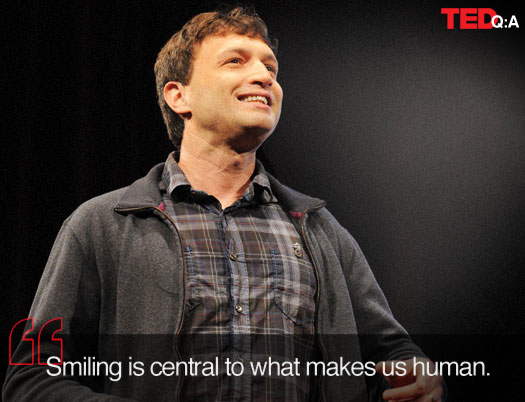How can something as simple as a smile be so deceptively complex? That’s the mystery and magic explored in Smile: The Astonishing Powers of a Simple Act, a new TED Book by Ron Gutman about the sensation and science of the smile. From the broad beaming grin of a toddler to the oily smirk of a used car salesman, smiles convey an enormous range and depth of emotions. Grins also have radically varied meanings in different cultures, as the author learned during his many worldwide trips to explore the complicated but ubiquitous act of smiling. We recently spoke with Gutman about his book.
Why is smiling so important?
Smiling is central to what makes us human. We’re the only species that smiles, and we do it from birth. It has an immense impact on how we feel, because smiling triggers our biological pleasure receptors. It also positively impacts how others see and perceive us, and can be a powerful way to improve social situations. Best of all, smiling is important because it’s natural, always available, and easy.
How long have people been researching the act of smiling?
In the book I mention a French neurologist Guillaume Duchenne, whose research in the mid 1800’s was focused on the different types of facial expressions, including smiles. Duchenne created an extensive catalogue of smiles and other facial expressions, but found one in an entirely different class from all the others. He called it the “genuine” smile—the smile that arrives spontaneously and reflects pure delight. Duchenne also inspired Charles Darwin to conduct research into smiling. Darwin detailed the early smiling behavior of his own children and wrote the facial feedback response theory, which noted that facial expression intensified emotion, and the suppression of facial expression lessened emotional response.
You’ve traveled the world quite a bit talking about this. Have you discovered cultural differences in relation to smiling?
When you are in a new place, where you don’t speak the language and don’t have a knowledge of the cultures and customs, you’re left with what’s universal and what transcends the things that make us different. Smiling is one of those great unifiers. Still, it’s still subject to regional norms. Different cultures are more or less accepting of smiles in different situations. For example, in the United States, smiling at strangers is commonplace. In some other countries, however, smiling at a stranger might arouse suspicion. But, generally, we’re all likely to smile for the same reasons: we’re happy.
Does a smile have to be real to be effective? The nervous counterfeit smile of Miss America, for instance, seems to go a long way.
Smiles are highly effective in activating the reward mechanisms of our brains, so even forced smiles, the so-called “social” smile, can be effective at communicating. But they don’t offer the truly great effects that genuine smiles. The full spectrum of the benefits of smiling are found in real, genuine, big smiles. These are the ones that make us feel great inside, and make others around us smile. They make us look not just friendly in the eyes of others, but also competent. As studies examining the health and well-being benefits of smiles show, the real benefits are reserved for real smiles.
Can someone smile too much? I’m thinking of the creepy smirk of a used-car salesman.
There’s no such a thing as too much genuine smiling. The beautiful thing about smiles is that we are hardwired to detect smiles that are genuine and smiles that aren’t. We know that we can trust genuine smiles, but we don’t have the same feelings about fake smiles. There’s a bunch of research that I’m mentioning in the book that shows how we detect the authenticity of smiles, and they’re mostly based on mimicking the smiler to experience the same feelings and emotions she/he does. So smile much, smile often, and smile genuinely.
Smile: The Astonishing Powers of a Simple Act is part of the TED Books series, which is available for the Kindle and Nook as well as on Apple’s iBookstore.

Comments (5)
Pingback: The Power of your Smile | Ki-Stone Wellness
Pingback: Motivational Quote Of The Day – 8 Dec 2011 – Norman Vincent Peale – Happy Thoughts « Through Mother Shyra's Eyes